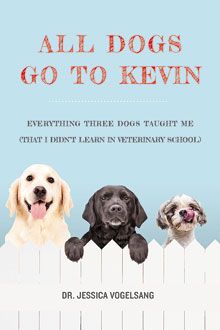Called beyond traditional veterinary practice
Dr. Jessica Vogelsang dedicates veterinary careerand her websiteto humor, compassion and good death experiences for pets.

Dr. Jessica VogelsangKnown as “Dr. V,” Jessica Vogelsang, DVM, creator of the blog Pawcurious, has combined her love of writing and her passion for in-home pet hospice care to create a veterinary career that expands beyond traditional veterinary practice. Her book, All Dogs Go To Kevin: What Three Dogs Taught Me (That I Didn't Learn in Veterinary School), is scheduled for release this summer. But it has always been Vogelsang's humor and compassion that has boosted her social media status, which includes 23,000 Twitter followers and 15,000 likes on Facebook. Her YouTube videos can garner more than 33,000 views.
Vogelsang still practices veterinary medicine as well. She is the director of Paws into Grace, a small animal practice in the Greater San Diego area that emphasizes compassionate in-home hospice care. During her popular talks on the topic, she describes how this type of euthanasia-at home with the pet's human family around it-can help people, especially children, better understand and accept the death process.
dvm360: You started your career in a traditional way. What prompted you to follow your own path?
Vogelsang: When I graduated, the idea of working as a veterinarian in anything other than private practice, government or research was just not something anyone discussed as a possibility. So I did what most people do; I went into practice and experienced what many young vets do, which is this terrible internal conflict of trying to balance work and parenthood, to be there 100 percent for both of those demands.
I've always been a writer, from my first experience as the editor of my junior high school newspaper up to now. I started my blog, Pawcurious, in 2009 as a hobby to keep me entertained while I was up late with my young children. I was still working part time for corporate practice, but the writing was a lot more fun. As the blog grew and I started to get offers to write for other venues, I took that as an opportunity to get away from the rigidity of a practice schedule and embrace something more flexible.
I started in hospice when I called on a former colleague to do an in-home euthanasia of my dog Kekoa. She offered me a part-time job doing home visit end-of-life care, which I decided to try because I missed working with clients one-on-one and found it was something I really enjoyed. So between the hospice and the writing, I managed to cobble together this very fulfilling and completely untraditional way to use my veterinary degree, and I love it!

dvm360: Who is Kevin in All Dogs Go To Kevin?
Vogelsang: There are actually two Kevins. The first is a made-up Angel of Death who steals pets. He came about when my then 3-year-old misheard me say our dog had gone to heaven. “Who's Kevin?” he asked, and the rest was history.
The second Kevin was a real person and one of my husband's best friends. He died at age 40 from complications of pneumonia. We still terribly miss him every day. He anchors the book because he really was a dog in human clothing: accepting of anyone, generous with his love, a little goofy, and gone from this earth much too soon.
dvm360: What do you hope readers will take away from your book?
Vogelsang: The basic message is this-pets make people better. The three dogs I talk about in the book helped me through three very different periods in my life: an awkward adolescent phase, a tumultuous bout with postpartum depression, and the transition into stable adulthood. Each of the dogs was there for me and helped me get through those times; each in their own unique way. I hope people see a bit of themselves and their own relationships in there, because it is such a universal, loving experience to share a life with a dog who then has to leave you when their work is done.
dvm360: Why is pet owner outreach important to you and to the veterinary field?
Vogelsang: As we all know, social media has rapidly supplanted traditional media and advertising in terms of how people exchange information, seek out advice and choose whom to trust. The traditional model has been turned on its head. Detached experts doling out advice from on high are usually written off, and people turn to online forums or self-described “experts” for advice that in some cases means life or death.
There are many people who are actively trying to drive a wedge into the trust veterinarians have built with their clients over the years, because it's advantageous for them to have that trust themselves in order to build their audience, sell vitamins or magazines, or whatnot. In order to win that back, we need to become more adept at communicating with the new generation on their own terms by generating more personal relationships, more immediate feedback and using more technology.
I think people still want, desperately, to trust their vets, but we have to be there in the trenches to make those connections, and to provide a counterpoint to the stories that are out there and provide accurate information when it's needed. We're getting better at it, little by little.
dvm360: You care deeply about what you call “a good death experience for pets.” What do you mean by that?
Vogelsang: One of the things that has always struck me when performing a euthanasia is the number of people who relate a prior traumatic experience with a pet. Even when we perform a technically perfect euthanasia, sometimes little things that we don't think much of can be very upsetting for people-a cold table, a slight muscle twitch. It really can mess people up, and I bet most of them never even shared with their vet what upset them. People are so much more open in their own comfort zone at home, less focused on those small things and more on the big picture.
One time I pulled up to a home and saw seven cars in the driveway, which made me nervous because it can be very stressful doing this in front of a large audience. The owner was so upset she could barely talk. She was able to explain that her father had died in an agonizing manner, and she was very worried about her pet experiencing the same. I took it slow, and things went perfectly. At the end, she leaned back, grabbed her husband's hand, and said, “That. Was. Awesome.” I almost cried! To see that weight of grief lifted a little by knowing her pet died surrounded by love, pain-free and peaceful-what an honor that is.
dvm360: You've given talks promoting the concept that pet death experiences can help people deal better with human death. Can you elaborate?
Vogelsang: I'm fascinated by this major divide between the veterinary community and the human medical community when it comes to death and euthanasia. In the human medical world, it's called “assisted suicide” and seen as the ultimate violation of “do no harm.” So we see these people in the advanced end-stages of dying, unable to take care of themselves and perhaps suffering, and the overwhelmed family rushing between hospital and nursing home waiting for the person's body to finally give out. Most of the time they aren't even present for the death of a loved one, which makes death both a thing to fear and a mystery.
We vets view euthanasia as a gentle medical assist to a terminal process, a way to relieve suffering, a mandate that absolutely fulfills “do no harm.” Once the decision has been made, we can choose a time before the pet is in an acute crisis, plan it so that family and friends can be present, and have a peaceful goodbye. It helps people understand that death is something that can feel like a warm blanket and not a firebrand to the head. They see this and want this for their own family members, this peaceful death surrounded by loved ones. Perhaps it will help empower them to choose home hospice down the road for themselves. I think it's so important, so very important.
dvm360: Your recent blog post about your mother's inoperable glioblastoma and her choice to be home at the end rather than in an impersonal hospital setting is very moving. Why did you decide to share that with your audience?
Vogelsang: All of that happened not two months after I got up in front of a big crowd and publicly proclaimed we should do all we can to help our loved ones die at home. It was all very theoretical at the time. I never would have done the talk if I suspected my mother, sitting there in the audience, was already suffering a terminal disease. That said, I just had to look up at the sky and say, “OK! I get it!” I spoke with my husband, and my parents moved in to my home as soon as she was discharged from the hospital into hospice care.
I've tried to always be respectful of other people's privacy on the blog, and I struggled with whether or not to share her story. I decided to share some of what we were going through because it really mirrors so many of the themes I've spoken about in the past. I wanted people to understand that, yes, these lessons we learn from our pets really do carry over.
On the other hand, there are many small moments, triumphs, sadness, indignities and frustrations that I don't share. I didn't want to write something that would feel like a betrayal of privacy, but I hope what I did share helps someone who reads it at the right time.
Donna Loyle is a Philadelphia-based freelance writer who specializes in veterinary and healthcare topics. She is the former primary editor of the North American Veterinary Licensing Examination.